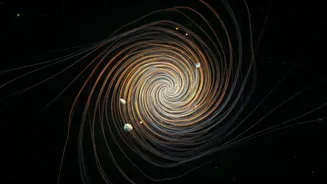Information's Role Explored
The conventional view of the universe is being challenged by a fresh perspective: information itself could be a fundamental building block. This paradigm
shift, centered around entropy, presents an intriguing hypothesis. It posits that the very fabric of spacetime and gravity is intricately linked to information content. The notion of a companion anti-universe then enters the picture. This model suggests that the accelerated expansion observed in our universe is not driven by mysterious dark energy, but instead arises from the influence of this anti-universe. This concept offers the potential to demystify complex issues such as dark matter, offering a more unified understanding of the cosmos' structure.
Gravity's Entropic Origin
The proposed model delves deep into the relationship between gravity and entropy. Entropy, often associated with disorder, takes on a pivotal role in this framework. The researchers suggest that gravity, far from being a fundamental force, is an emergent property. This means that gravity isn't a primary force, but rather a consequence of the universe's tendency to maximize entropy, which is a measure of the disorder. Essentially, the way that information is distributed and organized in the universe gives rise to the gravitational effects we observe. This challenges existing ideas, suggesting that the search for a quantum theory of gravity might lie in understanding entropy and information at the most basic levels.
Anti-Universe, Accelerated Expansion
A particularly striking element of this model is the concept of a partner anti-universe. This anti-universe, existing alongside our own, is proposed to interact with our universe in a way that affects its expansion. The accelerated expansion, a phenomenon currently attributed to dark energy, could be explained without it. This interaction, according to the model, is driven by the exchange of information and the interplay of entropic forces between the two universes. The implications are significant, as they challenge the need for dark energy to explain the observed behavior of the universe. This provides a potentially elegant solution to one of the most perplexing problems in modern cosmology.
Unifying Quantum & Relativity
One of the primary goals of this model is to unite quantum mechanics with general relativity. Quantum mechanics governs the very small, while general relativity describes the very large, yet the two theories do not mesh neatly. The model, focusing on information and entropy, offers a pathway toward this unification. The idea is to formulate a description of gravity that incorporates quantum effects naturally, linking these disparate fields. By understanding gravity as an emergent property based on the distribution of information, it becomes possible to find common ground between these two fundamental theories. This could lead to a more complete and coherent description of the universe, from the smallest particles to the largest structures.
Dark Matter's Illusions?
The model extends beyond explaining the accelerated expansion and also offers potential insights into dark matter. Dark matter, which makes up a significant portion of the universe's mass, is another mystery. This new framework suggests that dark matter may be an illusion. If gravity is an emergent property influenced by the distribution of information, then the observed effects of dark matter might arise from the way the universe's information content is organized and structured. Rather than requiring unseen particles, the gravitational effects attributed to dark matter could, in essence, be a manifestation of the underlying information and entropy driving the universe. This is a very intriguing idea that opens up the possibility of explaining many of the universe’s most bizarre phenomena.













